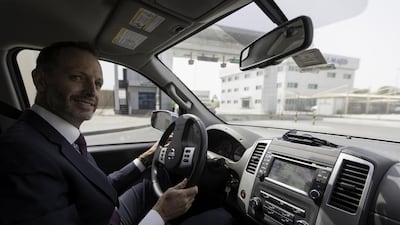DUBAI // Residents heading to Oman for Eid Al Fitr are being urged to take extra caution and check the weather conditions before starting their journey.
With many travellers on the road, especially near the border, drivers are advised against tailgating, speeding, swerving, illegal overtaking and overtaking on the hard shoulder.
There have been several fatal accidents on Oman’s roads involving Emiratis in recent years. In August 2015, a nine-year-old girl, two women and two men from the same family were killed when their 4x4 collided with a lorry about 220 kilometres from Muscat.
In July last year, two Emirati teenagers were killed and a third injured while driving home from Oman.
And in August that year, a 10-year-old Emirati and his father were killed in a road accident in the Sultanate while driving back to the UAE.
Earlier this month, eight people, including two Emiratis, were killed when the bus they were travelling in collided with a trailer in Central Oman.
“Four-wheel drive vehicles are, more often than not, the choice of road users travelling from the UAE,” said Julian Moro, a security director at International SOS, which provides travel advice and emergency services and repatriation.
“However, it’s worth bearing in mind that figures from the Royal Oman Police show that 64 per cent of all road deaths in the country come from these types of cars. So travellers should be extra cautious if driving or travelling in a four-wheel drive.”
Motorists who plan to hire a four-wheel-drive to travel to Oman are advised to check when the vehicle was last serviced, and ensure they are well aware of the vehicle’s safety features.
Before a long car journey, drivers should have their vehicle tuned up, make sure the tyre pressure is correct and ensure there is enough fuel. “When driving, it’s important to keep an eye on your speed and avoid tailgating or passing other cars on the hard shoulder,” he said.
Many people who choose to travel to Oman for public holidays often do not know enough about traffic and safety conditions on the country’s roads.
Every year, there are 1.24 million fatalities from road traffic accidents globally, and for those aged between 15 and 29, it is the leading cause of death.
“Sadly, while the trend in Oman appears to be going down, the country still has one of the highest rates of road traffic accidents in the world according to official figures,” Mr Moro said.
Drivers need to keep in mind the driving behaviour in the Sultanate, such as infrequent use of indicators, often very darkly tinted windows which reduces drivers’ ability to anticipate, good quality roads that encourage some drivers to drive at excessive speeds, and seat belts not universally worn.
“I have frequently observed drivers using handheld devices for voice or data,” he said. “Be extra cautious when driving near pedestrians and expect the unexpected.”
Pedestrians make up 23 per cent of road deaths in Oman, Royal Oman Police statistics show.
Glenn Havinoviski, associate vice president of US traffic management company Iteris, said based on his experience travelling to Oman, there have been frequent safety issues due to roadway capacity.
“As there are fewer motorway facilities in Oman compared with the UAE, there are more single carriageway roads and at-grade junctions, or junctions of two roads that do not have a bridge separating the roads,” he said.
“The terrain is very mountainous in much of the country. When combined with high travel speeds and high traffic volumes, all of this sharply increases the potential for crashes.”
Travellers are asked to check the routes, weather conditions, local speed limits and laws before leaving the UAE.
“It rains far more in Oman at this time of the year,” said Mr Moro.
Functioning seat belts – which can reduce fatality rates by about 75 per cent – should be fitted in the front and back of the vehicle. Taking regular breaks is also important to combat driver fatigue.
“Once you are in the car, make sure that everyone is wearing their seat belt and watch your speed,” Mr Moro said. “Reducing your speed by 5 per cent has been shown to cut the chance of a fatal crash by 30 per cent.”
Mr Havinoviski agreed.
“It is always best to obey the posted speed limits and allow for slowdowns where there are at-grade junctions, roundabouts, traffic signals, and merges from side roads.
“Drivers should anticipate that congestion could occur at any time on main roads.”
rruiz@thenational.ae

